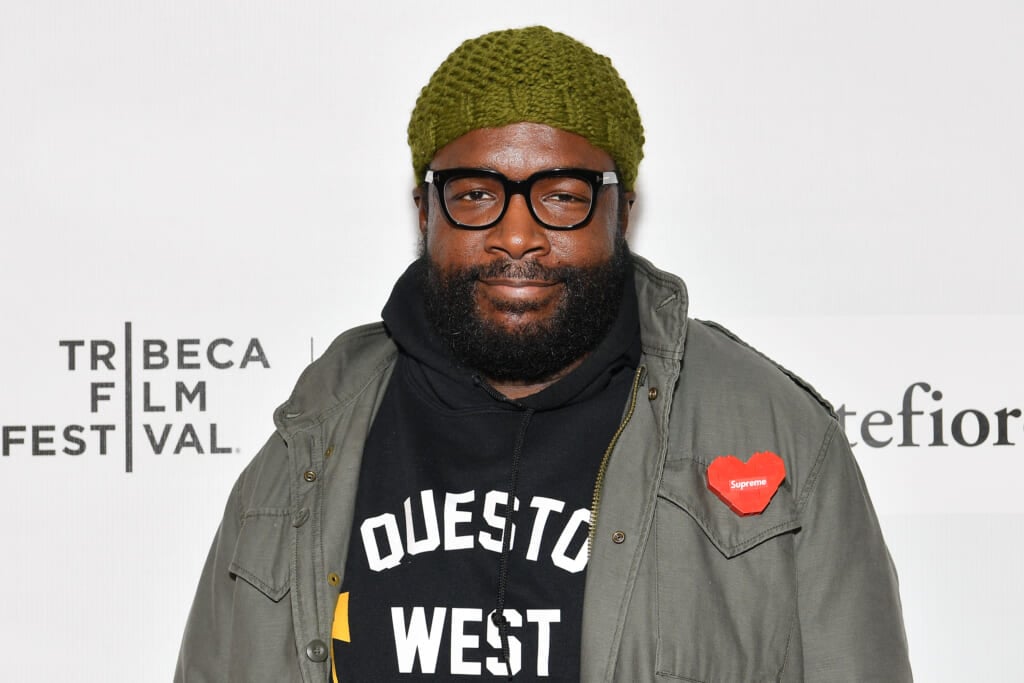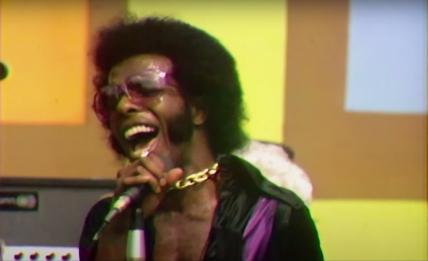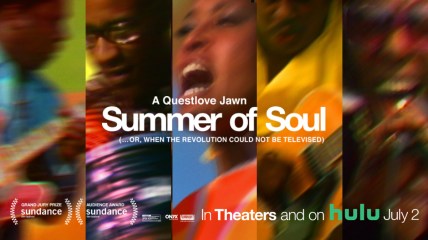Questlove talks preparation, discovering surprises for his documentary ‘Summer of Soul’
The Roots bandleader spoke about directing his first documentary, the filmmakers who gave him advice and details about the Harlem Cultural Festival that didn't make it to film.
The new music documentary Summer of Soul (…or when the revolution would not be televised) has only been available to the public for one week and it’s already taking its place among the best concert film documentaries of recent memory.
The praise its received from critics and fans has not only been because it unearthed glorious footage of the 1969 Harlem Cultural Festival that featured performances by Stevie Wonder, Nina Simone, and Sly and the Family Stone, but it also addressed the issue of Black music history being omitted from public consumption.
The film’s director, Ahmir “Questlove” Thompson, did such a masterful job at balancing the grandeur of the performances, the regal spirit of Harlem, and the indignation of Black erasure, it’s hard to believe it was his very first film.
He spoke to theGrio to discuss how he prepared to direct the documentary, what caught him off guard during the preparation, and what factored into Black events being pushed to the side.

Thompson, the five-time Grammy-winning drummer and bandleader of The Roots, is no stranger to music documentaries. His encyclopedic knowledge of music has landed him appearances as a subject matter expert in numerous documentaries, including Finding The Funk, Bad 25, Mr. Soul!, 808 and Mr. Dynamite: The Rise of James Brown.
However, it was his experience producing the 2019 episodic hip-hop documentary series Songs That Shook America, which examines the making and impact of a classic rap songs like Kanye West’s “Jesus Walks,” Queen Latifah’s “Ladies First” and Outkast’s “Elevators,” that aided in developing his skill as a storyteller.
Thompson said he first got the call to direct Summer of Soul halfway through Songs That Shook, and calls the experience “a great starting point.”
“So, I will say that in doing Songs That Shook, just as a sounding board,” Thompson said. “I got to learn it was like a crash course, if you will, in learning how to tell a story, how to tell an interesting story, how to figure out alternative ways to deliver a story that’s been told before, different angles and what rocks to look under for different answers.”
While he had been getting a solid foundational education on documentary filmmaking, Thompson decided to make some uncomfortable calls to directors and cinematographers to put him on the right path for this mammoth undertaking.
“It’s like how do you cold call Spike Lee or Ava DuVernay and say, ‘Hey, I’m kind of, you know, directing a movie,'” Thompson said.
As it turned out he did wind up getting important advice and encouragement from DuVernay, director and cinematographer Ernest Dickerson, and Oscar-winning film producer Ezra Elderman.

“Coming in the gate, I wanted to make sure that our crew represented what America was and wanted to make sure that we hired an extremely, extremely diverse cast of people to help deliver this message across,” Thompson said.
Once you see the film, you’ll understand why having a diverse film crew was so crucial to the film’s success. The 1969 Harlem Cultural Festival was a feast for the Black and brown neighboring community that displayed a cornucopia of cultural and musical flavors from nearly every corner of the Africa diaspora, be it the Afro-Latino polyrhythms of Ray Barretto and Mongo Santamaria, the righteous, unapologetic freedom music of Max Roach and Nina Simone or the lamenting blues of B.B. King.
As an avid collector of rare music performances himself, Thompson was eager to live with the festival footage. As mesmerizing the performances were, even to someone who’s seen tons of performances over the years, it was after receiving the production notes of the festival’s director Hal Tulchin that he was put into shock overbooking information about the festival.
“What surprised me was the ‘almost and it didn’t’ happen moments,” Thompson said.
During the film, gospel legends Mahalia Jackson and Mavis Staples sing a duet of “Precious Lord, Take My Hand,” but that wasn’t the original plan.
“We discovered that Aretha Franklin was an 11th-hour cancelation two or three days before,” Thompson revealed. “So, it was Aretha Franklin that was supposed to sing with Mahalia Jackson.”
Another surprising omission was the rejection of a Rock and Roll guitar innovator. “We discovered that James Marshall [Jimi] Hendrix requested to play this festival,” Thompson said.
However, the planning committee turned him down. Thompson suspects that promoter didn’t think that Hendrix’s aesthetic fit with the line-up, as he was notorious for burning guitars on stage and using unfamiliar acrobatics like playing with his teeth and behind his head.
Thompson believes the festivals planners didn’t realize that the singer/songwriter was “undergoing a personal sea change,” as he was in the process of return to Black Blues roots.
“However, he was denied playing the festival,” Thompson said. “So instead, him and the Band of Gypsies and Freddie King, Blues great, do three separate weeks of Harlem after-shows for the Harlem Cultural Festival.”
Despite six weeks’ worth of concert footage with such luminaries being captured to film, it sat in a basement for 50 years before it was finally brought to the light. Unfortunately, Summer of Soul is just the latest example of transformative Black music artifacts that sat in obscurity for five decades – Mr. Soul! (2021), Amazing Grace (2018), Soul Power (2008) – before filmmakers realized their importance.
Thompson expressed his theory on why there’s been such a cycle of Black erasure, which he chalks up to “benign racism.” He explained that while many may feel they aren’t bigots just because they’ve never been to a KKK rally or used racial slurs. However, Thompson stated that the “passive-aggressive” nature of not releasing something because you can’t relate to it has led so many important moments like the Harlem Cultural Festival to get buried.
Now that Summer of Soul is out, Thompson says he’s been bombarded with requests to do more such films.
“There’s like four or five other events that I’m getting DM’s about right now that are also, you know, sitting in this particular university’s library for the longest,” Thompson said. He hopes that the flood gates will now open for more Black music moments to receive the same treatment and pedestal.
“This might unearth a retelling in sort of a treasure chest or a trove of history that we didn’t know about,” Thompson said. “So, I feel as though now, what I hope is that that this unearths a billion other Black stories that we weren’t privy to.”
Have you subscribed to theGrio’s podcast “Dear Culture”? Download our newest episodes now!
TheGrio is now on Apple TV, Amazon Fire, and Roku. Download theGrio today!


